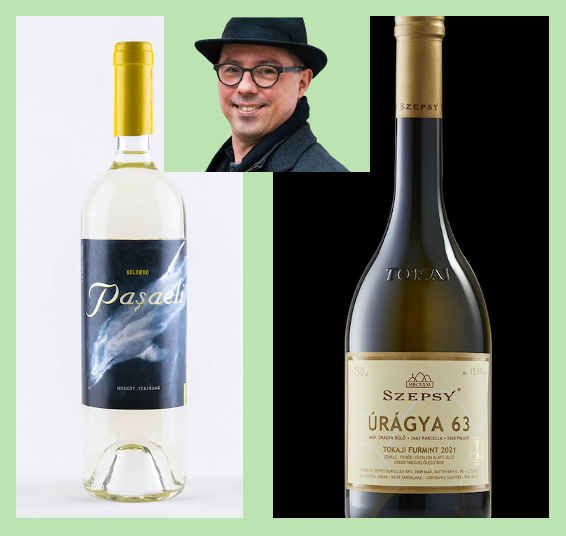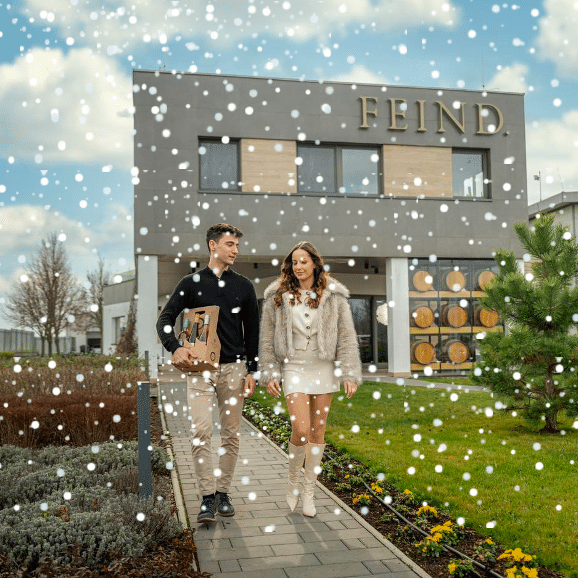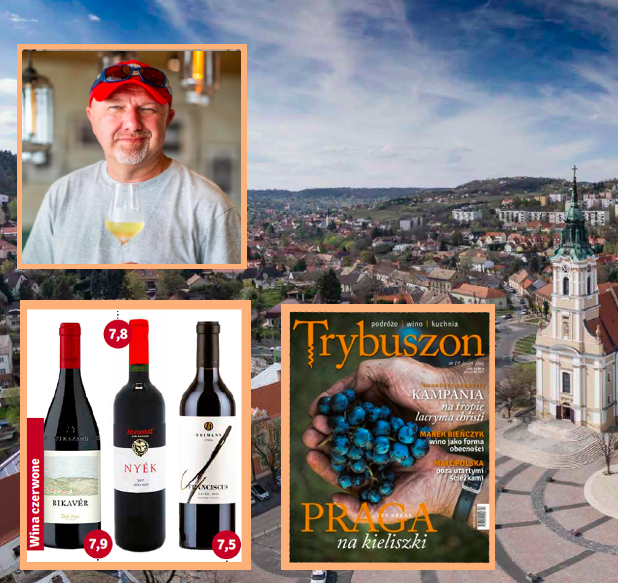A Welsh–Hungarian tale of wine, truffle and success
Importer of the Week: Best of Hungary
Country: United Kingdom, Wales
Labels so far: Attila Cellar (Eger), Balassa (Tokaj), Béres (Tokaj), János Bolyki (Eger), Dobosi (Balaton Uplands), Dubicz (Mátra), Figula (Balatonfüred), Frittmann (Kunság), Gál Tibor (Eger), Gróf Buttler (Eger), Holdvölgy (Tokaj), Kolonics (Somló), Kreinbacher (Somló), Laposa (Badacsony), MAD Wine (Tokaj), Patricius (Tokaj), Riczu (Villány), St. Andrea (Eger), Takler (Szekszárd), Tokajicum (Tokaj), Tóth Ferenc Winery (Eger), Vesztergombi Cellar (Szekszárd), Wassmann (Villány)
From dentistry to grocery
– What’s your story? How did you get to the United Kingdom and why did you start a wine and gourmet food business?
– We moved to the UK over 13 years ago together with my then teenage son. I was a practicing dentist in rural Wales but having grown-up in the Hungarian countryside where we had access to delicacies like goose liver, I have been interested in fine food and wine from a young age. We then decided to start our family business four years ago, first focusing on traditional Hungarian products like paprika and single-flower honeys, as well as gourmet ingredients like black truffle products, artisan oils and vinegars. Once we have found our feet and successfully navigated British regulations, we then expanded our portfolio to include Hungarian wines as well.
– There are not many vowels in your address… Why Wales? What do you love and hate about Wales?
– Wales is a really beautiful part of the UK; we live on the coast in the west of the country, with the sea just a couple of miles away from our home. It is a lovely place full of friendly, welcoming people, where the pace of life is just a little bit slower, and you are still greeted by people on the streets. The only downside I can really think about is the rain and sharp wind, but we have more or less got used to it by now, and the luscious green countryside greatly compensates for it.
The star merchant of SWA and Wine Buyer Awards
– The majority of the award-winning Hungarian wines at the latest Sommelier Wine Awards are represented by you. Do you enter other competitions as well? Or do you consider this as one the most influential?
– We consider the Sommelier Wine Awards to be one of the most important British awards when it comes to the opinions of wine professionals, and it is an excellent indicator of a vintage’s potential in the food service industry. We have also entered the 2020 Women’s Wine and Spirits Award, and with 10 medals from 11 entries, I think it is fairly safe to say that our portfolio has plenty to offer to female customers. Of course, there are also the Decanter International Wine Awards, probably the most renowned and respected competition there is at the moment, and we are eager to find out how our wines have faired this year.
– You also became one of the three finalists at the ‘Online Specialist’ category of the Wine Buyers Awards. To what do you attribute this success?
– It has been a great honour to have got so far in the competition, and I would like to think that this achievement is proof that we have constructed our portfolio the right way. Our current range consists of 63 wines from 8 wine regions, 33 of which have already won one or two international awards. We work closely with 18 winemakers, including organic and bio-dynamic producers, who are cultivating international varieties as well as indigenous ones. We are especially proud to stock 15 Hungarian varieties, and we are firm believers that you can only have a real taste of our country and its unique terroir through a wine made from a native grape.
Vineyard visits on Zoom
– How do you choose the wines for your portfolio? Do you visit wine regions in Hungary?
– We work closely with Gabor Herczeg from Happy Hungarian Wine, and together with input from his team of experts, we hand-pick individual vintages which we think are the most suitable for the British market. Gabor has been with us since the beginning of our journey through the wonderful world of wine, and his knowledge, his personal connections with the winemakers and his never-ending support has been an indispensable part of our success.
We have visited a number of wine regions last year to meet the winemakers personally and to gain those unique insights which we can only do by casually strolling through the vineyards or chatting by the cellars. Unfortunately, due to the Coronavirus situation this will not be possible in 2020, but we have been talking with them regularly over Zoom, discussing the latest developments and planning our next steps
.
– Frittmann Winery was one of the biggest hits at the SWA. Do you think this means that Hungary should put more effort into aromatic wines?
– We have found there to be somewhat of an under-appreciation, bordering on disdain at times, of aromatic wines amongst both Hungarian producers and consumers. Efforts are often focused around creating big, bold and stunning vintages, great provided the right setting, but more often than not people are looking for easy-drinking wines to brighten their evenings. The excellent result by Peter Frittmann proves that such vintages deserve to be considered for inclusion on any restaurant’s wine list, while they also provide outstanding value-for-money to wine lovers everywhere.
– You sell ’Turul’ from Vesztergombi Winery. How do you find, are your customers interested in stories about Hungary?
– Customers more than ever are interested in finding out more about their food and drink, and Hungary has so much to offer in this regard. British people are eager to experience new flavours and learn about different cultures. With our thousand years of gastronomic tradition, an interesting and varied history and centuries of experience and know-how, we are ideally suited to providing a ‘culinary trip of a lifetime’. Hungary is one of the only four countries in the world, alongside the powerhouses of France, Italy and Spain, which produces black truffle, caviar and goose liver. In the form of sparkling wines and Tokaji Aszú, we also have the natural pairings for these delicacies, allowing us to interweave food and wine into an unparallelly rich gastronomic tapestry, providing our customers with a unique chance to experience the best that Hungary has to offer.
Key to success: a combination of style, story, and substance.
– How about Tokaji Aszú? Do you find it hard to sell?
– Sweet wines are certainly not the easiest to sell, but if you find the right markets for it then it can have its place in the UK market. It is known by many from a certain age group, who have tasted some of its not so premium quality iterations under the socialist times which can present an initial barrier. However, once that initial stigma can be overcome and the history of the wine, the expertise behind each bottle and its unrivalled complexity and flavour is allowed to shine, then it suddenly becomes a viable option for all those looking for a sweet/dessert wine.
– Who are your customers?
– We have a fairly wide customer base, ranging from online shoppers to private buyers, and from Michelin star restaurants to independent deli shops. The multi-faceted nature of Hungarian winemaking and wonderful variety available, while it can feel like a curse at times, is also our greatest strength, as we really have something to offer to everyone.
– Do you organize any tastings?
– We used to before the arrival of Coronavirus, as we think it is one of the best ways to raise awareness and to enhance the currently modest profile of our wines. Obviously, the lock-down has put an end to in-person tastings, therefore we have moved our efforts online and we are starting a series of masterclasses and virtual tastings through Facebook Live. Each session is built around a central theme, starting with Bull’s Blood from the Eger region, while the winemakers themselves will provide background information and unique insights into their creations.
– What would you suggest to Hungarian winemakers to help your sales?
– To be successful, we have found that we need a great combination of style, story, and substance. The latter is amply provided by the winemakers, however at the beginning we have quite often found them to be lacking in the former two. An appealing label is essential, one that is stylish and most importantly is at least bilingual, containing relevant information about the winemaker and the wine. Once customers’ interest has been piqued, a fascinating narrative can transform an unknown and slightly intimidating bottle into a must-buy. By the time we get to the final step and the wine is opened, we know that what the customer is going to taste was lovingly crafted by the some of the best winemakers of the country.
Comments ( 24 )
-
Trackback: lucabet
-
Trackback: lnw69
-
Trackback: Lsm99 เว็บ lotto thailand อันดับ 1
-
Trackback: ทำความรู้จักกับเว็บหวย Jetsadabet เจษฏาเบท
-
Trackback: ที่มาของเว็บ ufalivesport
-
Trackback: Agent lsm99 ทางเข้าเล่น LSM99
-
Trackback: หมออรรถ อย่าฝากชีวิตไว้กับหมอ
-
Trackback: วิธีสร้างเพจ Facebook
-
Trackback: ไอบีซีเบ็ต มีกีฬาให้เล่นครบ
-
Trackback: ตรวจสอบสลิปโอนเงิน
-
Trackback: ทดลองเล่นสล็อต PG168
-
Trackback: hor voor raam naar binnen open
-
Trackback: av
-
Trackback: ไข่สั่น
-
Trackback: Debelov
-
Trackback: pg168
-
Trackback: ไอศกรีมงานแต่ง
-
Trackback: uodiyala
-
Trackback: RELX
-
Trackback: slot Book of Ra
-
Trackback: lesbian silicone doll
-
Trackback: ชุดเครื่องเสียง
-
Trackback: SAGAME350
Comments are closed.







Trackback: ทำจมูก พัทยา